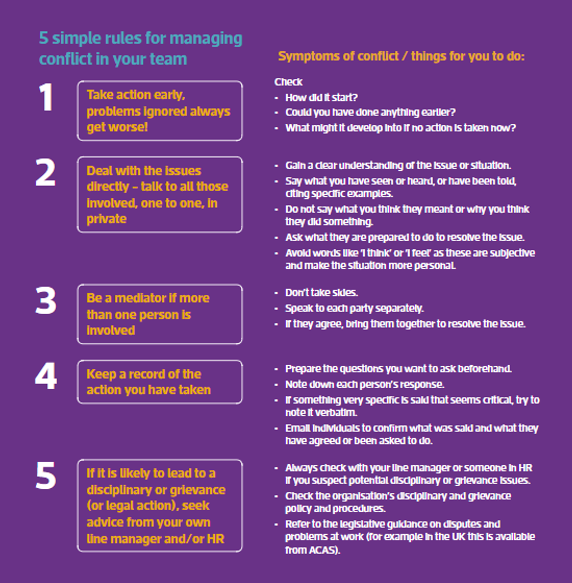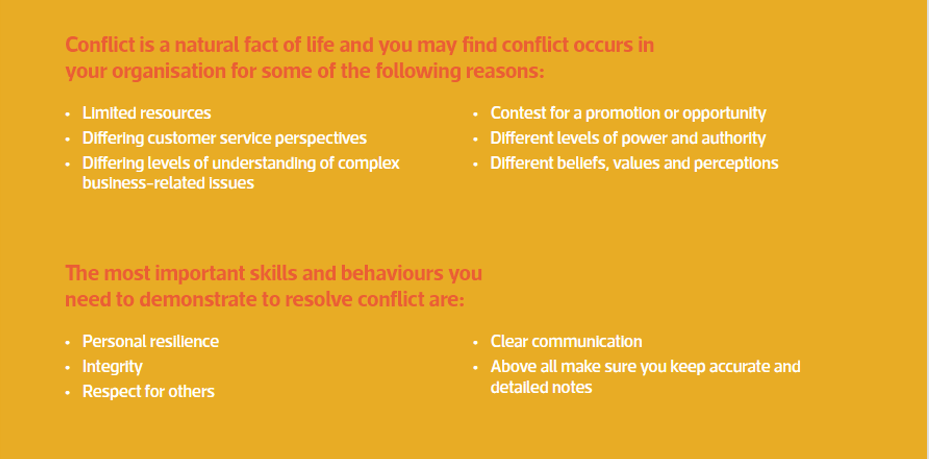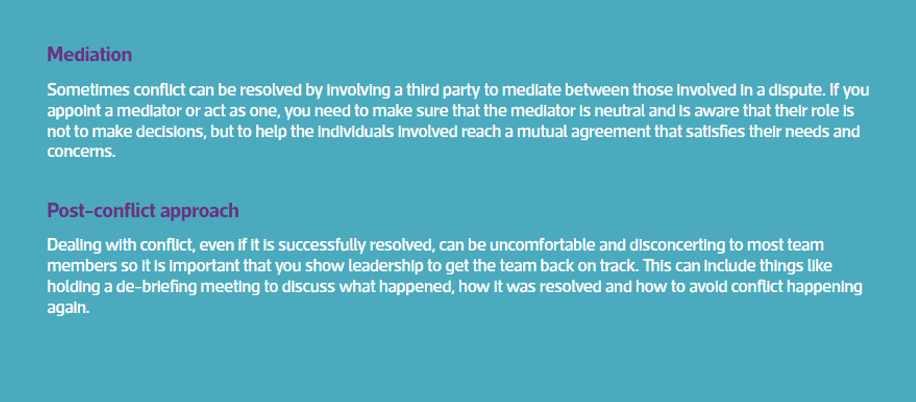Conflict occurs when one person (or a group) perceives that another person (or a group) is preventing them achieving their needs and goals or is blocking them from expressing their values and beliefs in a way that they think is reasonable.
Conflict is a perfectly normal part of being a human being. It can be internal – inside our heads or it can be external – with others. Conflict can be toxic, harmful and destructive (dysfunctional). It can also be a powerful driver of change, learning and growth (functional).
Conflict will occur when you have a group of people working together, even if they all share a common goal, measurable targets, and a clear vision. Conflict arises because people think and behave differently, they have individual personalities, differing communication styles and sense of priorities.

A degree of conflict can be good for an organisation. It introduces new ideas, positive challenge and prevents group thinking; and some disagreements are minor, with no long term consequences. However, conflict that generates negative emotions (irritation, anger), is something to be avoided. More serious conflict can be disruptive and has the potential to be costly if an employee alleges harassment, bullying or worse.
Many leaders try to avoid conflict at all costs and when it arises tend to manage disagreements inappropriately. However, dealing with conflict constructively can lead to increased productivity, new ideas being generated and personal development for all team members.
Conflict prevention is generally considered the best policy by creating a supportive, positive and stable team environment. This will help to reduce the likelihood of unhelpful conflicts developing. A good working environment will establish a base level of respect and trust between team members / colleagues and enable all individuals within the group to focus on their responsibilities.

Approach
It is important to handle all conflict issues promptly and sensitively, to be reasonable and non- judgemental in your approach. This will help to diffuse the situation and prevent it from escalating into a more serious matter.
Difficult conversations
Conflict within your team may inevitably mean you have to conduct some difficult conversations. Detach yourself from the immediate behaviour of the individual and focus on the specific actions required from them when having this discussion. Ask the individual to describe ideal behaviours and ask them to benchmark themselves against this, and raise the standards expected of employees throughout your discussion. In having regular, open and honest conversations with your team members, you may be able to avoid conflict as all parties know what is expected of them.
There may be times when you need to undertake difficult conversations as part of the performance management process, when dealing with under-achievement (and you may wish to refer to Leadership Essentials No. 18 Managing Performance). It is important to handle these conversations sensitively to avoid the situation escalating to one of conflict.

References
ACAS (2014). Managing conflict at work www.acas.org.uk/index.aspx?articleid=1218 ACAS (2017). Challenging conversations and how to manage them www.acas.org.uk/index.aspx?articleid=3799 Ghaffar, A (2012). Conflict in Schools: Its Causes & Management Strategies Journal of Managerial Sciences Vol.3 No.2 McCrae, R. & John, O. (1992). An Introduction to the Five-Factor Model and Its Applications Journal of Personality Vol.60 No.2 pp.175-215 www.workplacebullying.org/multi/pdf/5factor-theory.pdfLiddle D. ( 2017 ). Managing Conflict: A Practical Guide to Resolution in the Workplace Kogan Page
How do you deal with conflict? Test yourself with our Scorecard.
If you’re a member, you can test yourself on Dealing with Conflict and see if you meet the standard.
Spotlights
Further Resources
From the Blog




